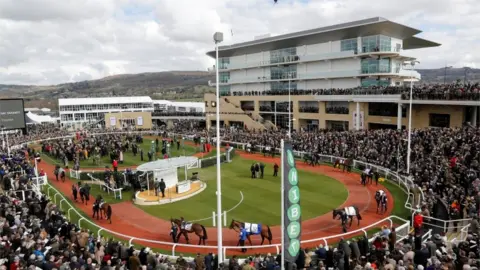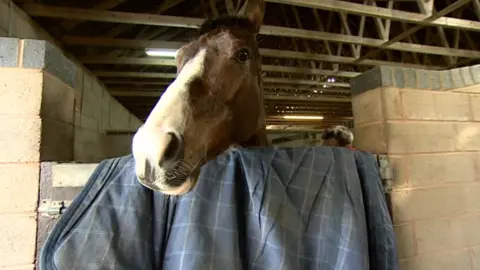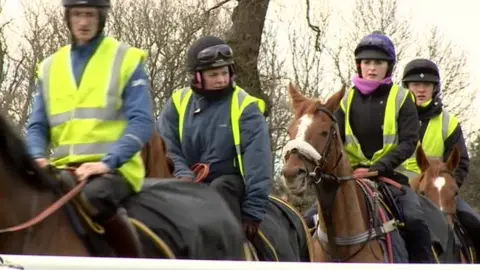Hard Brexit could make for heavy going at Cheltenham
 Reuters
ReutersWhat price Cheltenham Races post Brexit?
It's one of the biggest events in Britain's entire sporting calendar. About 250,000 people converge on Cheltenham's famous recourse during the four days of racing.
After weeks of unseasonably bad weather, the going is officially rated 'heavy', but it's the fears of a hard Brexit that threaten to make the atmosphere at the national hunt festival rather less 'festive' than usual.
Here's the problem.
About 200 of the horses competing there this week are from Ireland.

Almost three quarters of the horses raced in Britain each year are bred in either Ireland or France.
Around 32,000 people work in the racing industry on either side of the Irish Sea, like a seamless business worth over £5bn a year to the UK and Irish economies according to the accountancy firm Deloitte.
How might border restrictions affect their jobs, and the rural economy as a whole in which a further 60,000 people depend on racing for their livelihoods?
It may look like a novel twist in the argument about freedom of movement, not just of people but also of horses.
But the deal allowing more than 10,000 horses to move freely every year between Britain, Ireland and France goes back to a tripartite agreement struck by those three countries back in the 1960s, long before the UK joined what was then the Common Market.
That's why the Environment Secretary Michael Gove, a committed Brexiteer, says it should continue after Britain's departure from the EU.
Opting-in, and out
"For years they've been demanding opt-outs. Now they want us to give them opt-ins".

That's how one European Commission official reportedly summed-up his exasperation with what they see there as the UK's pick-and-mix approach to the negotiations.
The Irish vice president of the European Parliament Mairead McGuiness MEP says: "Horse racing depends on the best horses moving freely across Ireland, the UK and France. It would be a disaster if the best horses couldn't even make the first hurdle."
Meantime a UK Government spokesman said: "Our priority is for the movement of horses to continue with minimal delay and bureaucracy while safeguarding welfare, bio-security and disease control. We are working with Ireland and France on developing new arrangements for after we leave the EU."
So this issue is clearly being drawn into the wider Brexit negotiations.
 PA
PAA further peculiarity in all this is that in Parliamentary terms, Cheltenham racecourse is not in Cheltenham at all. It's in the Tewkesbury constituency of one of the most committed Brexiteers on the Conservative back benchers. I asked Laurence Robertson if Britain's departure from the EU could be bad news for an event which brings a business bonanza to his corner of Gloucestershire every year.
He told me he was confident a solution would be found because Ireland and France had just as much at stake as Britain. And so did the EU itself.
At the risk of mixing my metaphors, he was equally bullish about the position of those stables staff working across the various national borders.
Mr Robertson reminded me racing is a global business. "This is not just about the EU," he told me. "Stable staff come here from as far afield as the Indian subcontinent, the Far East and Australia."
One racing certainty is that we'll have more on this in this weekend's Sunday Politics Midlands. We come under starter's orders at 11.00 on BBC One.
